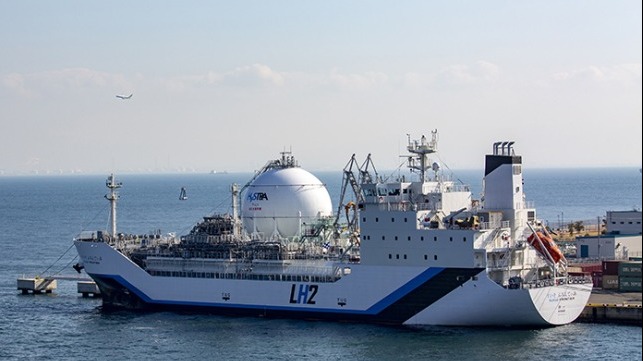Japan Launches CO2 Transport R&D Efforts Including MOL and K Line

Two of Japan’s leading shipping companies, Mitsui O.S.K. Lines (MOL) and Kawasaki Kisen Kaisha (K Line), along with other large Japanese companies, will all be joining in a research project focusing on developing carbon capture and marine transportation technologies. The overall project is being led by Japan's New Energy and Industrial Technology Development Organization (NEDO), as part of the Japanese government’s long-term strategy to meet the goals of The Paris Agreement on climate change.
Japan’s strategy recognizes the importance of carbon capture and storage (CCS), carbon dioxide capture and Utilization (CCUS), and carbon recycling as technologies to significantly reduce CO2 emissions. It points out the need for the development of effective CO2 transport due to the great distances between CO2 emission sources and storage areas.
NEDO called for proposals for R&D and demonstration projects as part of an effort to develop appropriate business models to transport CO2 safely and economically. The program is looking for means to safely transport large volumes of CO2 emitted from factories and thermal power plants to areas, where CO2 can either be used or stored at a low cost.
One of the demonstration projects selected involves MOL working with Japan CCS Co., the Engineering Advancement Association of Japan, Itochu Corporation, and Nippon Steel Corporation. This project focuses on R&D to establish the technology to transport liquefied CO2 by ship as well as a feasibility study on using ships as part of CCUS projects. The demonstration will seek to test a vessel capable of transporting 10,000 tons of CO2 annually.
As part of the project assigned by NEDO to JCCS, MOL will undertake R&D on the adoption of a large-scale CO2 carrier. Earlier in 2021, MOL invested in Norway-based Larvik Shipping, which is a leader in commercial CO2 transportation.
K Line joining with Nippon Gas Line Co. and Ochanomizu University will also participate in the NEDO research program. Working under a project with the Engineering Advancement Association of Japan they will seek to promote the development of liquified CO2 maritime transportation. K Line, NGL, Ochanomizu University, and ENAA will jointly develop technologies for liquefied CO2 marine transportation that will contribute to the realization of long-distance, large-scale CO2 transportation. The goal is to enable cost reductions through the development of CCUS technology in the demonstration project.
K Line said that it will build off its experience in the management of liquefied gas (LNG/LPG) carriers. Additionally, K Line is also participating in the “CO2-Free Hydrogen Energy Supply-Chain Technology Research Association” (HySTRA) and is cooperating in a domestic demonstration test of the world's first liquefied hydrogen carrier, the Suiso Frontier. Based on its experience with the safe navigation and cargo operation of liquefied gas carriers and demonstration project of HySTRA(R1), K Line will conduct a safety and environmental evaluation during navigation and cargo operation for the demonstration liquefied CO2 carrier and establish technical guidelines.

that matters most
Get the latest maritime news delivered to your inbox daily.
The research projects are expected to run until 2026.
